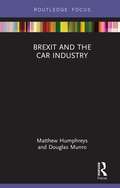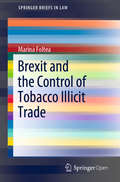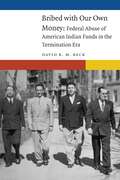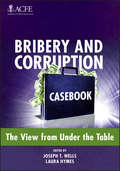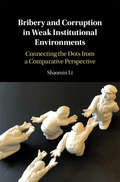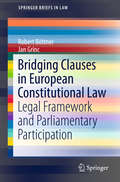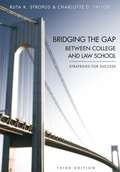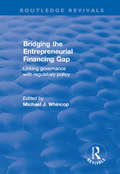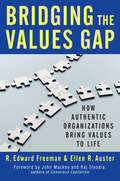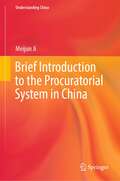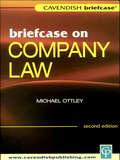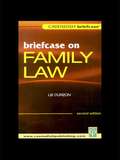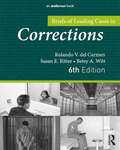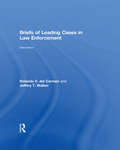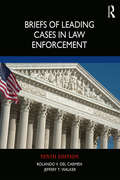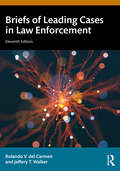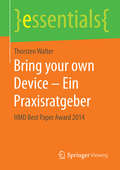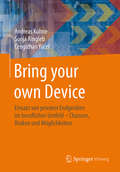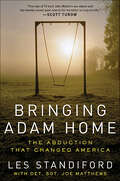- Table View
- List View
Brexit and the Car Industry (Legal Perspectives on Brexit)
by Matthew Humphreys Doug MunroOne of the principal arguments put forth by Brexit supporters is that by freeing the UK from the stranglehold of EU law, the country will be able to expand its markets through increased bilateral trade and enhance economic growth. This book tests this proposition by reference to the car industry. Brexit and the Car Industry explores the international position of the car market to argue that the hope of Brexit bringing regulatory freedom is illusory. The book starts by examining the structure of the vehicle industry, how its regulatory framework evolved and how the environment in which it operates is constrained by international standards and the practicalities associated with trading across different regulatory systems. By examining the evolution of vehicle regulations, particularly related to the environment, it argues that a UK independent path is not only impractical but self-defeating. The private car market is structured in such a way that is global, and meeting the various international regulatory requirements is a price of entry requirement which no bilateral trade agreements are likely to alter. The book also considers changing environment affecting the car industry in the context of an aspiration for regulatory freedom. The response to climate change and the impact of technological change – specifically driverless vehicles – are big questions for the industry and both are examined in this book. The book also considers the emergence of large metropolitan areas imposing their own use and environmental requirements operating separately to national standards. The future of electric and autonomous vehicles combined with the complexity of the regulatory environment with both international and localised pollution measures make the UK navigating a safe independent path through with a viable car industry highly questionable. Providing a comprehensive review of the relationship between regulatory frameworks and free trading models, this book is aimed at industry and legal professionals. It will also be of interest to students studying market behaviour, free trade law and the free movement of goods, and environmental protection.
Brexit and the Control of Tobacco Illicit Trade (SpringerBriefs in Law)
by Marina FolteaThis book assesses the consequences of Brexit for the control of illicit trade in tobacco products in the UK and EU. Based on the currently applicable legal framework, it examines the significance of a possible non-application of the acquis communautaire in the UK in matters relating to anti-illicit trade in tobacco legislation. It also analyses the modes of future cooperation between the UK and the EU in this area, as well as possible regulatory scenarios and their consequences. The book comprises six main sections. After the introduction (Section 1), Section 2 discusses the state of play of Brexit and possible outcomes of Article 50 of the Treaty of European Union procedure. Section 3 illustrates the data and trends of illicit tobacco trade in the UK. Section 4 describes the relevant legal (e.g. trade and fiscal measures) and enforcement frameworks in the UK and suggests possible post-Brexit scenarios in control of tobacco illicit trade. Section 5 focuses on the relevance of arrangements between governments and the tobacco industry in the control of illicit trade. Section 6 then analyses the relevance of key EU and global anti-illicit trade initiatives. Lastly, Section 7 the book offers some recommendations and conclusions on how the UK could control illicit trade in tobacco after Brexit.
Brexit and the European Insurance Market: An empirical Analysis of the Impact on the Structure of the European Insurance Market, Stock Market Reactions and the Solvency II Supervisory Regime (Business, Economics, and Law)
by Antonia MüllerWith the Brexit referendum more than 50% of the British population voted in favour of the UK leaving the EU. Since that event, much speculation has been about Brexit impact on the global economy, also affecting the insurance market. Existing papers and literature indicate potential significant Brexit implications on the structure of the European insurance market due to the loss of the European Passport, the European Solvency II supervisory regime, as well as on stock prices of insurance companies based in the EU and UK, but so far there is no holistic view on this topic. The dissertation aims to bring together the fragmentary information on Brexit implications for the European insurance market, develop methodological approaches further, conduct new analyses, and reflect a holistic picture of the impact of Brexit on the European insurance market, focusing on the structure of the European insurance market, stock market reactions and the Solvency II supervisory regime.
Brexit und der Finanzmarkt: Die rechtlichen Auswirkungen auf grenzüberschreitende Finanzdienstleistungen (essentials)
by Lisa Löbig Domenik H. WendtDer sog. „Brexit“ ist einer der wohl größten Einschnitte in der Geschichte der Europäischen Union. Für die im Finanzmarkt der EU agierenden Akteure stellt sich zunehmend die Frage, unter welchen Voraussetzungen nach dem Brexit grenzüberschreitende Finanzdienstleistungen erbracht oder in Anspruch genommen werden können. Lisa Löbig und Domenik H. Wendt skizzieren die möglichen rechtlichen Folgen, die ein harter Brexit für deutsche und britische Finanzmarktteilnehmer mit sich bringt. Hierbei wird auf ausgewählte Beispiele aus dem Finanzmarkt unter Berücksichtigung wirtschaftlicher und rechtlicher Aspekte eingegangen.Die Autoren: Lisa Löbig ist Absolventin des Studiengangs Wirtschaftsrecht (LL.B.) an der Frankfurt University of Applied Sciences und frühere Mitarbeiterin am Fachbereich Wirtschaft und Recht. Derzeit ist sie bei einer Wirtschaftsprüfungsgesellschaft in Frankfurt am Main tätig. Prof. Dr. Domenik H. Wendt, LL.M. ist Professor für Bürgerliches Recht, Europäisches Wirtschaftsrecht und Europarecht an der Frankfurt University of Applied Sciences und Direktor des Instituts für Vertragsgestaltung und Konfliktlösung (IVK).
Brian Dickson
by Kent Roach Robert J. SharpeWhen Brian Dickson was appointed in 1973, the Supreme Court of Canada was preoccupied with run-of-the-mill disputes. By the time he retired as Chief Justice of Canada in 1990, the Court had become a major national institution, very much in the public eye. The Court's decisions, reforming large areas of private and public law under the Charter of Rights, were the subject of intense public interest and concern.Brian Dickson played a leading role in this transformation. Engaging and incisive, Brian Dickson: A Judge's Journey traces Dickson's life from a Depression-era boyhood in Saskatchewan, to the battlefields of Normandy, the boardrooms of corporate Canada and high judicial office, and provides an inside look at the work of the Supreme Court during its most crucial period. Dickson's journey was an important part of the evolution of the Canadian judiciary and of Canada itself. Sharpe and Roach have written an accessible biography of one of Canada's greatest legal figures that provides new insights into the work of Canada's highest court.
Bribed with Our Own Money: Federal Abuse of American Indian Funds in the Termination Era (New Visions in Native American and Indigenous Studies)
by David R. BeckIn Bribed with Our Own Money David R. M. Beck analyzes the successes and failures of Indigenous nations&’ opposition to federal policy in the 1950s and 1960s. Focusing on case studies from six Native nations, Beck recounts how the U.S. government coerced American Indian nations to accept termination of their political relationship with the United States by threatening to withhold money that belonged to the tribes. Termination was the continuation—and, federal officials hoped, the culmination—of more than a century of policy initiatives intended to end the political relationship between Indian tribal nations and the federal government. Termination was also intended to assimilate American Indian individuals into the country&’s social and economic culture and to remove the remainder of reservation lands from federal trust. American Indians hoped to gain greater opportunities of self-governance and self-determination, but they wanted to do so under the protection of the federal trust relationship.Bribed with Our Own Money analyzes both successful and unsuccessful efforts of Native nations to oppose this policy within the larger context of long-standing federal abuse of tribal funds. It is the first book to view federal termination efforts grounded in bribery for what they were: a form of coercion.
Bribery and Corruption Casebook: The View from Under the Table
by Joseph T. Wells Laura HymesReal case studies on bribery and corruption written by expert fraud examinersBribery and Corruption Casebook: The View from Under the Table is a one-of-a-kind collection of actual cases written by the fraud examiners who investigated them. These stories were hand-selected from hundreds of submissions and together form a comprehensive, enlightening and entertaining picture of the many types of bribery and corruption cases in varied industries throughout the world.Each case outlines how the bribe or corruption was engineered, how it was investigated, and how perpetrators were brought to justiceWritten for fraud investigators, auditors, compliance officers, and corporate lawyersReflects the recent crackdown on bribery and prosecution of cases under the Foreign Corrupt Practices Act (FCPA)Also by Dr. Joseph T. Wells: Fraud Casebook, Principles of Fraud Examination, and Computer Fraud CasebookThis book reveals the dangers of bribery and corruption and the measures that can be taken to prevent it from happening in the first place.
Bribery and Corruption in Weak Institutional Environments: Connecting the Dots from a Comparative Perspective
by Shaomin LiDrawing on twenty years of research and observations, Li explains how bribery and corruption are carried out in countries with weak institutional environments, and how these activities become globalized. By distinguishing rule-based, relation-based and clan-based governance, this book offers a novel explanation to the age-old puzzle of why some countries thrive despite corruption. It also sheds lights on the symbiotic roles corruption and anticorruption campaigns play in maintaining dictatorships. Applying cost-benefit analysis to different governance environments, Li argues that as non-rule-based economies expand, the transition from relying on private relationships to relying on public rules is inevitable. However, by highlighting the globalization of corruption by non-rule-based countries, this book warns against the potential threats and consequences of bribery by powerful dictatorial governments. This book will appeal to scholars, analysts and graduate students studying corruption, as well as policymakers, business professionals and executives seeking insights into the characteristics of bribery and corruption within different institutional settings.
Bridge Called Hope: Stories from the Ranch of Rescued Dreams
by Kim MeederISBN: 1-59052-269-9 Kim Meeder has seen horses go where no one else can tread -stepping through the minefield of a broken child's soul in a dance of trust that only God can understand. From a mistreated horse to an emotionally starved child and back again, a torrent of love washes away their barren places. Kim's ranch is a place where this miracle happens over and over again. It is a place where the impossible flourishes, where dreams survive the inferno of reality-a place where hope rises.
Bridging Clauses in European Constitutional Law: Legal Framework and Parliamentary Participation (SpringerBriefs in Law)
by Robert Böttner Jan GrincThe book focuses on the legal framework for the use of the bridging clauses of Article 48(7) TEU as well as on parliamentary participation in the process of activating these clauses. It also outlines national parliamentary participation in EU law in general and, specifically, in the procedures for the amendment of the Treaties. Further, it explores the substantial law of the general bridging clauses (scope of application, exceptions, legal effects) and explains in detail the special bridging clauses and similar provisions that are scattered throughout the Treaties. The study further deals in depth with procedural issues, including the procedural requirements in the provision itself, notably the important and most complex element: the participation of the national parliaments, both directly and indirectly through the (European) Council. To this end, the book includes an analysis of the safeguards and mandating systems that national legal orders have installed.
Bridging The Gap Between College and Law School (Third Edition): Strategies For Success
by Ruta K. Stropus Charlotte D. TaylorThis popular book helps students make the transition from their undergraduate experience to law school learning. Unlike other ''introduction to law school'' texts, Bridging the Gap offers a different approach because it: explains the ''why'' of law, providing students with the context necessary to understand why law school is taught in a certain manner; explains the ''how'' of the law, setting out a step-by-step process that will help students adapt to the law school setting; explains the ''what'' of the law, giving students the opportunity to practice the problem-solving process by providing numerous exercises in a variety of subject matter areas. Rather than giving only general advice, or black letter law and some practice problems for a specific subject, Bridging the Gap provides the context, the process, and the problems. Written by two former law school professors who used these techniques with thousands of students, Bridging the Gap is a guide to what really works in law school.
Bridging the Entrepreneurial Financing Gap: Linking Governance with Regulatory Policy (Routledge Revivals)
by Michael J. WhincopThis title was first published in 2001: Governments world-wide have developed policies to encourage innovation, entrepreneurship, and small firm growth, and to increase access to small firm finance. However, the effectiveness of small firms and entrepreneurs as innovators depends on their incentives and the effective governance of relations between entrepreneurs, investors, and employees. This book links these regulatory policies to the ethical and governance practices of small firms, in order to explain the impact and success these policies might be expected to enjoy. The book examines the empirical and theoretical nature of governance practices in small firms, as well as a range of regulatory policy areas, including intellectual property, insolvency law, taxation, securities regulation, and directors’ duties in Australia, Europe, and North America.
Bridging the Gap Between Aristotle’s Science and Ethics
by Henry, Devin and Nielsen, Karen Margrethe Devin Henry Karen Margrethe NielsenThis book consolidates emerging research on Aristotle's science and ethics in order to explore the extent to which the concepts, methods, and practices he developed for scientific inquiry and explanation are used to investigate moral phenomena. Each chapter shows, in a different way, that Aristotle's ethics is much more like a science than it is typically represented. The upshot of this is twofold. First, uncovering the links between Aristotle's science and ethics promises to open up new and innovative directions for research into his moral philosophy. Second, showing why Aristotle thinks ethics can never be fully assimilated to the model of science will help shed new light on his views about the limits of science. The volume thus promises to make a significant contribution to our understanding of the epistemological, metaphysical, and psychological foundations of Aristotle's ethics.
Bridging the Values Gap: How Authentic Organizations Bring Values to Life
by R. Edward Freeman Ellen R. AusterBridging the Values Gap Business has a values problem. It's not just spectacular public scandals like Enron (which, incidentally, had a great corporate values statement). Many companies fail to live up to the standards they set for themselves, alienating the public and leaving employees cynical and disengaged—resulting in lower productivity, less innovation, and sometimes outright corruption. The reason, argue top scholars and consultants Edward Freeman and Ellen Auster, is that all too often values are handed down from on high, with little employee input, discussion, or connection to the challenges and opportunities facing the organization. Although the words may be well-intentioned, they aren't reflected in the everyday practices, policies, and processes of the organization. This practically invites disconnects between intention and reality. To bridge this gap between the "talk" and the "walk", Freeman and Auster provide a process through which organizations can collectively surface deeply held values that truly resonate with everyone, from top to bottom. Their Values Through Conversation (VTC) process focuses on four key types of values conversations: introspective (reflecting on ourselves and how we do things in the organization), historical (exploring our understanding of our past and how it impacts us), connectedness (creating a strong community where we work well together), and aspirational (sharing our hopes and dreams). By developing values through discussions—casual or formal, one-on-one or in groups—VTC ensures that values are dynamic and evolving, not static words on a wall or a website. Freeman and Auster offer advice, real-world examples, and sample questions to help you create values that are authentic and embraced because they are rooted in the lived experience of the organization.
Brief Introduction to the Procuratorial System in China (Understanding China)
by Meijun JiBased on empirical research, this book comprehensively and thoroughly expounds the procuratorial system of socialism with Chinese characteristics and focuses on the organization, functions and powers, the system of prosecutors and the reform of the procuratorial system in China. It deeply analyzes the characteristics and reasons of the procuratorial system in China and not only discusses the dynamic process of the various kinds of procuratorial power in practice but also analyzes the common trend of the reform of the system of prosecution service in the world under the background of the globalization of judicial reform, especially those hot topics of the procuratorial reform in recent years, such as the reform of judicial responsibility, the reform of internal organization, the reform of quota control of prosecutors, the lenient system of accepting confession and punishment, the system of litigation of public interest and so on.In addition, with considering and studying the historical process and practice of the procuratorial system in China for more than 20 years, the author puts forward lots of unique ideas and proposals to reform and perfect the current procuratorial system and the procuratorial work mechanism in China. The book comprehensively discusses the historical origin, development process, current situation, reform and the direction of future development of the procuratorial system in China.
Briefcase on Company Law (Briefcase Series)
by MIchael OttleyThe Briefcase series is designed specifically with the time-pressed student in mind. It provides concise case summaries within each subject area of an undergraduate law degree, accompanied by relevant legislation. A handy reference tool, the book assists the reader to commit the content of each subject to memory. This title covers the four main areas of company law: the constitution, formation and personality of a company; corporate governance; corporate finance; and insolvency and company charges. The second edition has been updated to include recent important cases, including the House of Lords decision in Johnson v Gore Wood - (minority shareholder action) Phillips v Brewin Dolphin Bell Lawrie Ltd - (transactions at an undervalue) O'Neill v Phillips - (unfair prejudicial conduct) Williams v Natural Life Health Foods Ltd - (liability in negligence) the Privy Council decision in Agnew v Commissioner of Inland Revenue - (company charges).
Briefcase on Family Law (2nd Edition)
by L. B. Curzon<p>This Briefcase is made up of a very wide selection of cases chosen so as to enunciate and illustrate some of the fundamental principles applied by the courts to contemporary problems of family law. <p>The basic facts of the cases and the courts decisions are outlined, and particular attention is given to judicial comments on the essence of the legal questions under discussion. Special emphasis is placed on recent decisions of the Court of Appeal and House of Lords. Attention has been paid to the implications of the recent announcement that the Family Law Act 1996 has been placed on hold, with the exception of the important Part IV of the Act, relating to domestic violence. Full reference tables of cases and statutes are given. <p>Presentation of the text is designed specifically for students involved in preparation for law degrees and other law-related courses, and for social workers whose daily activities necessitate an understanding of the impact of the decisions of the courts on fundamental social problems related to the family.</p>
Briefs of Leading Cases in Corrections
by Rolando V. del Carmen Susan E. Ritter Betsy A. WittBriefs of Leading Cases in Corrections, Sixth Edition, offers extensive updates on the leading Supreme Court cases impacting corrections in the United States—prisons and jails, probation, parole, the death penalty, juvenile justice, and sexual assault offender laws. Each chapter contains an introduction to the topic area, making the book more user-friendly and a better source of succinct legal information than before. All cases are briefed in a common format to allow for comparisons among cases and include facts, relevant issues, and the Court’s decision and reasoning. The significance of each case is also explained, making clear its impact on prisoners and corrections in general. The book provides students and practitioners with historical and social context for their role in criminal justice and the legal guidelines that should be followed in day-to-day correctional activities. Twenty-one cases have been added, including those in a new section on the Antiterrorism and Effective Death Penalty Act.
Briefs of Leading Cases in Law Enforcement
by Jeffery T. Walker Rolando V. del CarmenBriefs of Leading Cases in Law Enforcement, Ninth Edition, offers extensive updates on the leading Supreme Court cases impacting law enforcement in the United States, creating a must-have reference for police officers to stay up-to-date and have a strong understanding of the law and their function within it. All cases are briefed in a common format to allow for comparisons among cases and include facts, relevant issues, and the Court's decision and reasoning. The significance of each case is also explained, making clear its impact on citizens and law enforcement. The book provides students and practitioners with historical and social context for their role in criminal justice and the legal guidelines that should be followed in day-to-day policing activities. Two new chapters have been added on Searches by Dogs (featuring United States v. Place, Illinois v. Caballes, Florida v. Harris, and Florida v. Jardines) and Computer/Cell Phone Searches (featuring Riley v. California). Additional new cases include: * In Chapter 4, covering Arrests and Other Seizures of Persons: Bailey v. United States * In Chapter 5, covering Seizures of Things: Missouri v. McNeely and Maryland v. King * In Chapter 6, covering Searches in General: Kentucky v. King * In Chapter 8, covering Searches With Consent: Fernandez v. California * In Chapter 9, covering Vehicle Stops and Searches: Navarette v. California * In Chapter 12, covering Electronic Surveillance: United States v. Jones * In Chapter 16, covering, Use of Force: Plumhoff v. Rickard * In Chapter 17, covering Confessions and Admissions: Cases Affirming Miranda: J.D.B v. North Carolina * In Chapter 18, covering Confessions and Admissions: Cases Weakening Miranda: Salinas v. Texas * In Chapter 23, covering Legal Liabilities: Messerschmidt v. Millender
Briefs of Leading Cases in Law Enforcement
by Jeffery T. Walker Rolando V. del CarmenBriefs of Leading Cases in Law Enforcement, Tenth Edition, offers extensive updates on the leading Supreme Court cases impacting law enforcement in the United States, creating a must-have reference for police officers to stay up-to-date and have a strong understanding of the law and their function within it. All cases are briefed in a common format to allow for comparisons among cases and include facts, relevant issues, and the Court’s decision and reasoning. The significance of each case is also explained, making clear its impact on citizens and law enforcement. The book provides students and practitioners with historical and social context for their role in criminal justice and the legal guidelines that should be followed in day-to-day policing activities.
Briefs of Leading Cases in Law Enforcement
by Jeffery T. Walker Rolando V. del CarmenThis resource offers extensive updates on the leading Supreme Court cases impacting law enforcement in the United States, creating a must-have reference for police officers to stay up-to-date and have a strong understanding of the law and their function within it. All cases are briefed in a common format to allow for comparisons among cases and include facts, relevant issues, and the Court’s decision and reasoning. The significance of each case is also explained, making clear its impact on citizens and law enforcement.This book provides students and practitioners with historical and social context for their role in criminal justice and the legal guidelines that should be followed in day-to-day policing activities.
Bring your own Device - Ein Praxisratgeber: HMD Best Paper Award 2014 (essentials)
by Thorsten WalterThorsten Walter beschreibt die technischen und juristischen Fallstricke sogenannter ,,Bring your own device"-Modelle und stellt die arbeitsrechtlichen Regelungsinstrumente für den Umgang mit BYOD vor. Darüber hinaus werden die verschiedenen technischen Lösungen zur Umsetzung von BYOD im Unternehmen in leicht verständlicher Form einander gegenübergestellt. Der Autor gibt praktische Empfehlungen zur Gestaltung von Regelungen in Nutzungsvereinbarungen.
Bring your own Device: Einsatz von privaten Endgeräten im beruflichen Umfeld – Chancen, Risiken und Möglichkeiten
by Andreas Kohne Sonja Ringleb Cengizhan YücelDas Buch betrachtet das Thema BYOD (Bring your own Device) ganzheitlich - ausgehend von einer Mobile-Strategie im Unternehmen werden alle relevanten Aspekte wie rechtliche Rahmenbedingungen, Sicherheitsrisiken und deren Behandlung, technische Voraussetzungen (Software, IT-Infrastruktur, Support), Einführungs- und Betriebskosten, Erreichbarkeit und Collaboration sowie soziale Aspekte, Unternehmenspolitik und die Implementierung von BYOD beleuchtet. Damit wird dem zunehmenden Trend zur Nutzung von privaten, mobilen Endgeräten im beruflichen Umfeld Rechnung getragen. Praxisnah befassen sich die Autoren mit Problemen und Fragestellungen rund um die Integration von privaten Endgeräten in die IT-Infrastruktur des Arbeitgebers und liefern konkrete Herangehensweisen, Empfehlungen und Best-Practices für die Planung, Prüfung und Umsetzung einer BYOD -Strategie. Das Buch hilft allen, die eine Einführung von BYOD in ihrem Betrieb prüfen, zu einem umfassenden Verständnis von Chancen und möglichen Risiken, aber auch von Alternativen zu gelangen.
Bringing Adam Home: The Abduction That Changed America
by Les Standiford Joe Matthews“[An] account of the decades-long attempt to solve the murder of Adam Walsh . . . as relentlessly suspenseful as anything I’ve ever read.” —Dennis Lehane, author of Small MerciesBefore Adam Walsh there were no faces on milk cartons, no Amber Alerts, no federal databases of crimes against children. The six-year-old’s 1981 abduction and murder in Hollywood, Florida—unsolved for more than a quarter of a century—forever changed America. His parents went on to become fierce advocates for missing children, and his father, John Walsh, served as host of America’s Most Wanted. From New York Times-bestselling author Les Standiford, Bringing Adam Home is a harrowing account of the terrible crime and its dramatic consequences, the emotional story of a father and mother’s efforts to seek justice and resolve the loss of their child, and a compelling portrait of Miami Beach Homicide Detective Joe Matthews, whose unwavering dedication brought the Adam Walsh case to its resolution.“The most significant missing child case since the Lindbergh [kidnapping]. . . . A taut, compelling and often touching book about a long march to justice.” —Scott Turow, author of Presumed Innocent“Compelling.” —Miami Herald“[A] page-turner . . . tough to forget.” —People“The definitive account.” —The Washington Post
Bringing Ben Home: A Murder, a Conviction, and the Fight to Redeem American Justice
by Barbara Bradley HagertyHow states are making their legal systems more equitable, seen through the story of a Black man falsely imprisoned for thirty years for murder.In 1987, Ben Spencer, a twenty-two-year-old Black man from Dallas, was convicted of murdering white businessman Jeffrey Young—a crime he didn&’t commit. From the day of his arrest, Spencer insisted that it was &“an awful mistake.&” The Texas legal system didn&’t see it that way. It allowed shoddy police work, paid witnesses, and prosecutorial misconduct to convict Spencer of murder, and it ignored later efforts to correct this error. The state&’s bureaucratic intransigence caused Spencer to spend more than half his life in prison.Eventually independent investigators, new witness testimony, the foreman of the jury that convicted him, and a new Dallas DA convinced a Texas judge that Spencer had nothing to do with the killing, and in 2021 he was released from prison.As Spencer&’s fight to clear himself demonstrates, our legal systems are broken: expedience is more important than the truth. That is starting to change as states across the country implement new efforts to reduce wrongful convictions, and one of the states leading the way is Texas.Award-winning journalist Barbara Bradley Hagerty has spent years digging into this issue, and she has immersed herself in Spencer&’s case. She has combed police files and court records, interviewed dozens of witnesses, and had extensive conversations with Spencer, and in Bringing Ben Home she threads together two narratives: how an innocent Black man got caught up in and couldn&’t escape a legal system that refused to admit its mistakes; and what Texas and other states are doing to address wrongful convictions to make the legal process more equitable for everyone.By turns fascinating and enraging, personal and provocative, Bringing Ben Home is the powerful story of one innocent man who refused to admit that he was guilty of murder, and how his plight became part of a paradigm shift in how the legal system thinks about innocence as it institutes new methods to overturn wrongful convictions to better protect people like Ben Spencer.
